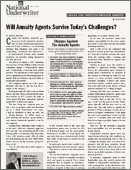National Underwriter April 16, 2007
 Could successful annuity producers face harsh regulatory sanctions and see their professional reputations destroyed if they continue to use marketing strategies that regulators may deem to be “misleading,” “unethical” and “dishonest?”
Could successful annuity producers face harsh regulatory sanctions and see their professional reputations destroyed if they continue to use marketing strategies that regulators may deem to be “misleading,” “unethical” and “dishonest?”
In Massachusetts at least, many annuity producers are probably asking themselves just that question.
The reason: On March 6, 2007, Massachusetts Secretary of State William Galvin released complaints against 2 Massachusetts agents and a broker-dealer concerning their market practices. The reputations of these agents may never completely recover after having their allegedly dishonest behavior reported widely in Boston-area mass media.
The complaint against one of the agents illustrates why this so. (See the box for examples of the charges.).
| CHARGES AGAINST THE ANNUITY AGENTS |
|---|
| The agent “has taken advantage of sophisticated marketing tools geared toward senior citizens to hold himself out as a knowledgeable and unbiased advisor to seniors with the undisclosed agenda of convincing them to sell their assets in order to buy unsuitable, high-commission annuities.” |
| The agent’s manner of marketing was tantamount to acting as an unregistered investment advisor. |
| The agent engaged in a “wide range of dishonest and unethical practices,” referenced a designation and a membership the agent holds and used an annuity marketing system. |
| The combined effect of the agent’s actions was to create an image of the agent as “a disinterested, ethical and knowledgeable advisor and therefore to enable him to convincingly advise seniors to sell securities and other assets in order to buy unsuitable, high-commission annuities.” |
| The agent sold “high commission annuities.” |
Reading through all of this made me think back to the time when I entered the life insurance business in 1977. I joined the ranks of career agents who then represented approximately 80% of all licensed agents.
The first thing my company gave me was a box of business cards that described me as a “Field Underwriter.” Of course, I had no flexibility to alter my title, use a “Doing Business As” (DBA) name or even advertise my services except within a very narrow framework supplied to me by my company.
Looking back-although I didn’t realize it at the time-with my company’s approval, that card said I was presenting myself to the buying public as something other than what I was: a life insurance agent. After all, what practical meaning did the term “Field Underwriter” have to my life insurance prospects? None at all.
Now, 30 years later, the world of agents is very different.
It has reversed itself in the sense that independent agents now account for 80% of all licensed agents, not the career agents. Furthermore, the effort to recast agents’ images away from an accurate portrayal of what they really do has been on steroids for the past 20 years.
In particular, agents have sought to reimage themselves away from the term “agent.” This trend is central to the Massachusetts complaint.
Yet, the Massachusetts complaint causes me to have a degree of sympathy for agents cited and agents in general. Every article published that is negative to annuities- and there have been many-reinforces the tendency of agents to find ways to sidestep annuities’ overt inclusion in the agents’ marketing. It’s a classic vicious cycle.
In my view, the insurance carriers bear primary responsibility for the tactics agents have used to create what they feel are tenable marketing identities.
Here is why: It was the companies that decided to sit back and become “manufacturers” of products and let someone else worry about the training, ethics, coaching, and motivation of the “distributors” (agents) who sell the products.
Further, in many cases, the carriers responded to aggressive product competition in the independent agent channel by raising agent commissions on annuities at the expense of reducing the value for consumers- i.e., those products carried longer surrender penalties, 2-tiered cash values and below-market credited interest rates. One need only look at the history of fixed indexed annuities for a telling example.
Starting with their mass transition to becoming independent producers, agents have increasingly become under-productive.
Consider: Back in the late 1970s, “an app a week” was the goal set for me. Today, agents typically sell few new cases in any given year. This only serves to expand the pursuit of 1035(a) exchanges as well as the attraction of higher commissions. If the agent has only 3 or 4 commission “events” over the course of 12 months, then each event had better be as large as possible. Again, a vicious cycle is at work.
Here too, the life insurance companies bear responsibility-for not providing sufficient support.
Independent annuity agents need consumer- facing technology and compliant, engaging sales and marketing tools so that, in a straight-up manner, they can reach more prospects and sell more annuities. Absent this, their productivity will not increase. The unfortunate result is that many will not be able to successfully transition to lower commission products.
If insurance companies want to build shareholder value, they need to preserve the viability of independent distribution. Only active participation in the distribution process will provide agents with what they really need to succeed.
Adapted with permission from National Underwriter Life & Health.
Copyrighted 2007 by The National Underwriter Company. All Rights Reserved.
